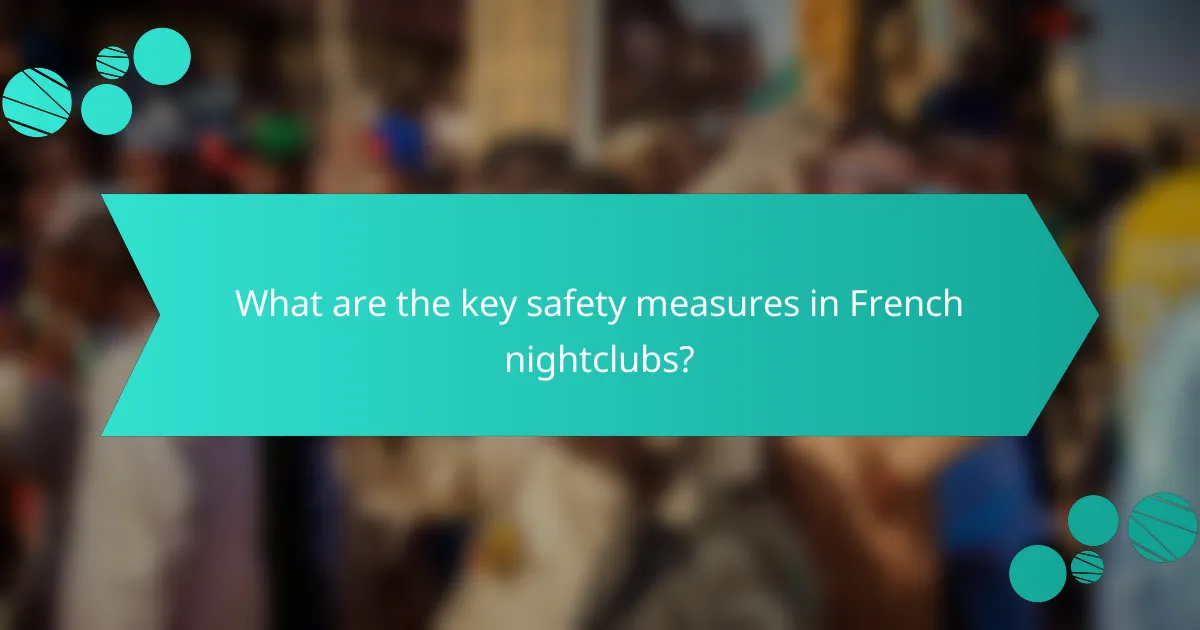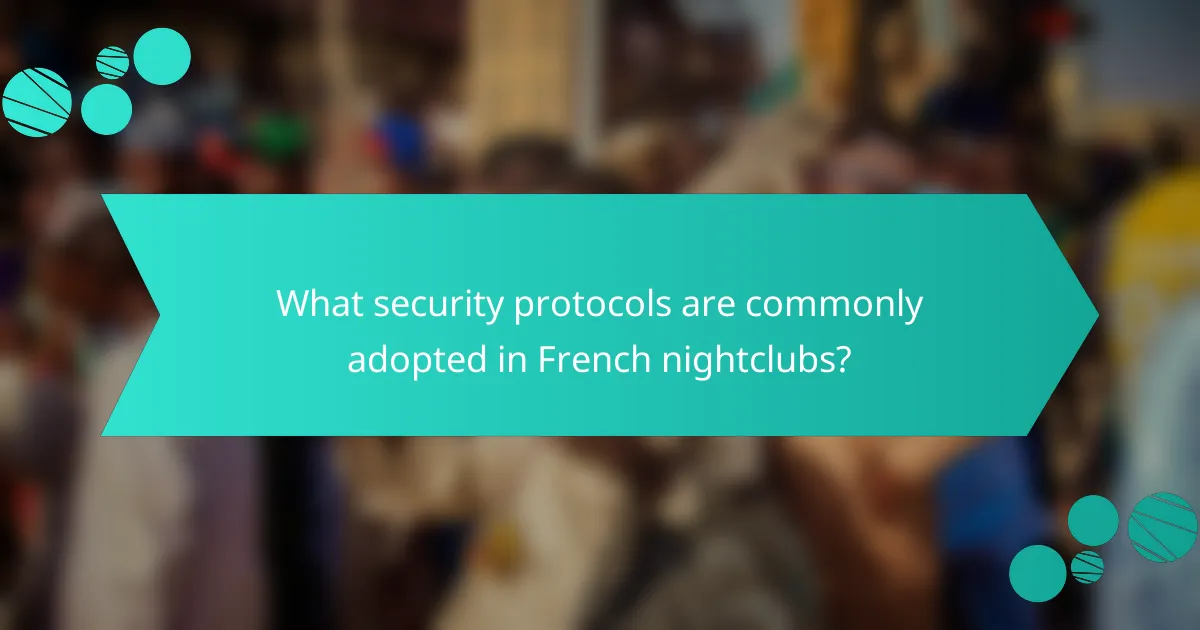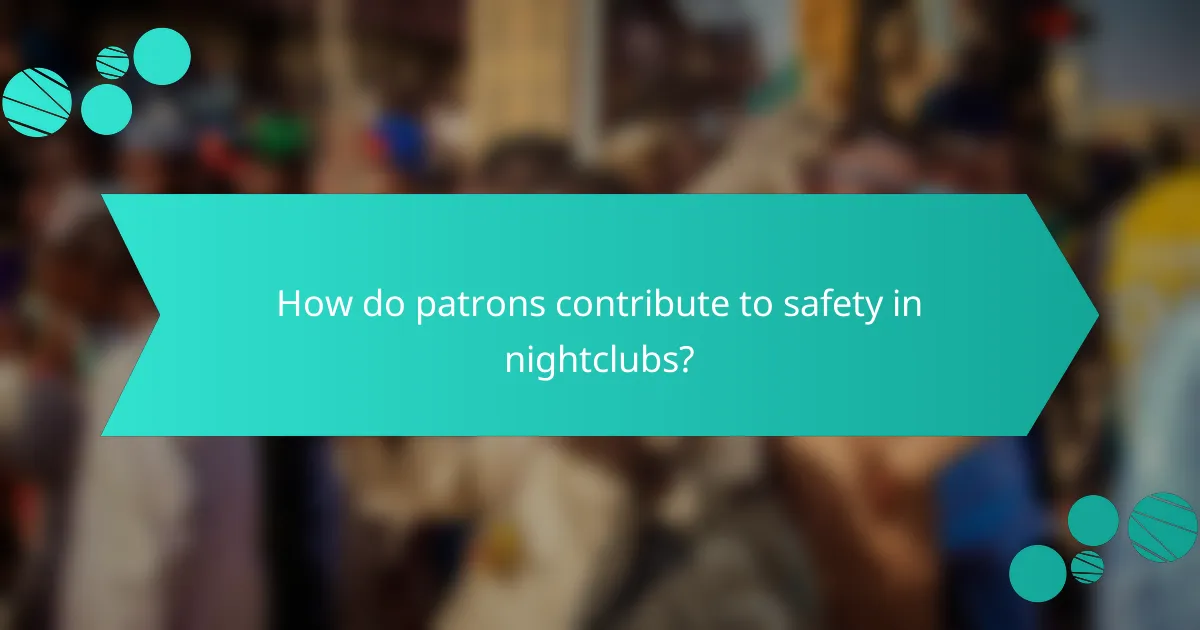Safety measures and security protocols in French nightclubs play a crucial role in ensuring patron safety. Key components include strict ID checks to verify age, surveillance systems for monitoring activities, and trained security personnel to manage emergencies and crowd control. Many venues enforce a zero-tolerance policy for drugs and violence, and emergency exits are clearly marked for safe evacuations. Patrons also contribute to a safer environment by being vigilant and reporting suspicious behavior, fostering a culture of mutual respect and responsibility. Collectively, these measures enhance the overall security and safety of nightlife experiences in France.

What are the key safety measures in French nightclubs?
Key safety measures in French nightclubs include strict ID checks, surveillance systems, and trained security personnel. ID checks ensure that only individuals of legal age enter the venue. Surveillance systems monitor activities within the club for safety and security. Trained security personnel are present to handle emergencies and ensure crowd control. Many clubs also implement a zero-tolerance policy for drugs and violence. Emergency exits are clearly marked and accessible. Regular safety drills are conducted to prepare staff for emergencies. These measures collectively enhance the safety of patrons in French nightclubs.
How do these safety measures protect patrons?
Safety measures protect patrons by reducing risks and enhancing security. These measures include surveillance cameras that monitor activities. They deter criminal behavior by increasing visibility. Security personnel are present to respond quickly to incidents. Bag checks prevent weapons and illegal items from entering. Emergency exits are clearly marked for safe evacuation. Staff training ensures effective handling of emergencies. Together, these protocols create a safer environment for all attendees.
What specific protocols are implemented for crowd control?
Crowd control protocols in French nightclubs include entry screening, capacity management, and emergency response plans. Entry screening involves checking identification and searching bags for prohibited items. Capacity management ensures that the number of patrons does not exceed legal limits. Emergency response plans outline procedures for evacuations and handling disturbances. Additionally, trained security personnel monitor crowd behavior and manage potential conflicts. Surveillance systems are also utilized to enhance security and ensure compliance with protocols. These measures help maintain a safe environment for patrons and staff.
How is emergency evacuation managed in nightclubs?
Emergency evacuation in nightclubs is managed through established protocols and staff training. Nightclubs typically have clearly marked emergency exits and evacuation routes. Staff members are trained to guide patrons safely during emergencies. Regular drills are conducted to ensure preparedness. Emergency lighting is installed to assist in dark conditions. Communication systems are in place to alert patrons and staff of emergencies. Local regulations often dictate specific safety measures for crowd control. These protocols aim to minimize panic and ensure quick evacuation.
What role does staff training play in nightclub safety?
Staff training is essential for ensuring nightclub safety. Trained staff can effectively manage crowd control and identify potential risks. They are equipped to handle emergencies, such as medical incidents or violent situations. Proper training includes understanding safety protocols and emergency response procedures. For instance, staff trained in conflict resolution can de-escalate tense situations. According to research by the National Institute for Occupational Safety and Health, trained employees reduce workplace accidents by up to 30%. Additionally, training fosters a culture of safety, encouraging employees to prioritize patrons’ well-being. Overall, staff training significantly enhances the safety environment within nightclubs.
What types of training do security personnel receive?
Security personnel receive various types of training to ensure effective performance. They undergo conflict resolution training to manage disputes peacefully. Additionally, they participate in physical security training to handle potential threats. Emergency response training prepares them for incidents like fires or medical emergencies. They also receive training in surveillance techniques to monitor activities effectively. Customer service training enhances their interaction with patrons. Legal training ensures they understand laws relevant to their duties. These training types are essential for maintaining safety in environments like French nightclubs.
How often is training updated or refreshed?
Training in French nightclubs is updated or refreshed regularly, typically every six months. This frequency ensures that staff are aware of the latest safety measures and security protocols. Regular updates are essential to address new regulations and evolving security threats. The training refreshers often include practical drills and theoretical knowledge. This approach helps maintain a high standard of safety and preparedness among staff. Compliance with local laws also mandates these updates. Regular training enhances the overall safety environment for patrons and employees alike.

What security protocols are commonly adopted in French nightclubs?
French nightclubs commonly adopt several security protocols to ensure the safety of patrons. These include ID checks at the entrance to verify age and prevent underage entry. Many clubs employ professional security personnel to monitor the venue and manage crowd control. Surveillance cameras are often installed throughout the venue to deter criminal activity and assist in incident investigations. Bag checks may be conducted to prevent the entry of prohibited items. Additionally, emergency exit routes are clearly marked to facilitate safe evacuations if necessary. These measures are standard practices to enhance safety and security in nightlife environments.
How do these protocols enhance overall security?
These protocols enhance overall security by implementing systematic measures to prevent incidents. They establish clear guidelines for staff and patrons. Training staff in emergency response is a key component. This ensures quick action during potential threats. Surveillance systems are often integrated into these protocols. They provide real-time monitoring of the premises. Access control measures limit entry to authorized individuals. This reduces the risk of unauthorized access. Regular safety drills prepare everyone for emergencies. These practices foster a culture of safety. Collectively, these elements create a safer environment for all.
What technology is used to monitor nightclub environments?
Video surveillance systems are commonly used to monitor nightclub environments. These systems include high-definition cameras installed at various locations. They provide real-time monitoring of activities within the venue. Access control systems are also utilized to manage entry and exit points. These systems often use key cards or biometric scanners. Additionally, crowd management technology helps analyze the flow of patrons. Environmental sensors monitor noise levels and air quality. All these technologies enhance safety and security in nightclubs.
How are incidents documented and addressed?
Incidents in French nightclubs are documented through incident reports filed by security personnel. These reports include details such as the date, time, location, and nature of the incident. Security staff are trained to complete these reports immediately after an incident occurs. Documentation also involves collecting witness statements and any available video footage. This thorough process ensures accurate records for future reference. Incidents are addressed by following established protocols, which may include contacting law enforcement or medical services if necessary. The nightclub management reviews the reports to identify patterns and implement preventive measures. Regular training sessions are conducted to ensure staff are prepared to handle incidents effectively.
What are the legal requirements for nightclub security in France?
Nightclub security in France must comply with several legal requirements. Security personnel must be licensed, which involves obtaining a professional card. This card is granted after completing a training course and passing a background check. Nightclubs are required to have a security plan that outlines measures for crowd control and emergency situations.
The establishment must also ensure that security staff are present during opening hours. They must be trained in first aid and conflict resolution. Surveillance systems are often mandated to monitor activities within the venue. Additionally, compliance with local laws regarding alcohol service and patron behavior is essential.
These requirements are enforced by local authorities to ensure the safety of patrons and staff. Non-compliance can lead to fines or closure of the establishment.
What licenses or permits are necessary for nightclub operation?
Nightclubs require various licenses and permits for legal operation. A primary license is the liquor license, which allows the sale of alcoholic beverages. Additionally, a business license is necessary to operate legally within the municipality. Nightclubs must also obtain a music license to play copyrighted music. Health and safety permits are often required to ensure compliance with local regulations. Fire safety permits are crucial for occupancy limits and emergency protocols. Lastly, some regions may require specific entertainment permits for hosting live performances or events. Compliance with these licenses ensures adherence to local laws and enhances patron safety.
How do regulations influence security protocols?
Regulations significantly influence security protocols by establishing mandatory standards and practices. They dictate the minimum requirements for safety measures in establishments, including nightclubs. Compliance with these regulations ensures that venues implement effective security strategies. For instance, regulations may require the presence of licensed security personnel and the use of surveillance systems. Moreover, they often outline emergency response procedures that must be followed in case of incidents. In France, the Code de la Sécurité Intérieure governs these regulations, impacting how nightclubs operate. Failure to adhere to these regulations can result in penalties or closure of the venue. Therefore, regulations serve as a foundation for developing comprehensive security protocols in nightclubs.

How do patrons contribute to safety in nightclubs?
Patrons contribute to safety in nightclubs by being vigilant and reporting suspicious behavior. Their awareness can help identify potential threats before they escalate. Patrons can also intervene in conflicts to prevent violence. Many nightclubs encourage a culture of mutual respect and responsibility among guests. This active participation fosters a safer environment for everyone. Studies show that engaged patrons reduce incidents of crime in nightlife settings. Additionally, patrons often assist staff in maintaining order by following rules and guidelines. Their cooperation with security personnel enhances overall safety.
What responsibilities do patrons have regarding their own safety?
Patrons have the responsibility to be aware of their surroundings. This includes recognizing potential hazards and understanding the venue’s layout. Patrons should also follow the nightclub’s safety protocols. Compliance with staff instructions is essential for personal safety. Additionally, patrons must avoid excessive alcohol consumption. Intoxication can impair judgment and increase risk. It is also important for patrons to travel in groups. This can enhance safety during entry and exit. Lastly, patrons should report any suspicious behavior to security. Prompt reporting can prevent incidents and ensure a safer environment.
How can patrons report suspicious behavior effectively?
Patrons can report suspicious behavior effectively by directly informing nightclub staff or security personnel. This ensures immediate attention to the situation. Providing specific details about the observed behavior is crucial. Patrons should describe the location, time, and individuals involved. Using clear and concise language helps convey the urgency of the situation. Many nightclubs also have designated reporting channels, such as emergency phones or text lines. Utilizing these resources can enhance the reporting process. Additionally, patrons should remain vigilant and observe any changes in the environment. This proactive approach contributes to overall safety in the nightclub.
What should patrons know about emergency procedures?
Patrons should know that emergency procedures are crucial for their safety in French nightclubs. They must be aware of the emergency exits located throughout the venue. Familiarizing themselves with the layout can help in a crisis. Patrons should listen to staff instructions during emergencies. Staff are trained to manage such situations effectively. Knowing the location of first aid kits is also important. These kits can provide immediate assistance if needed. In case of fire or other emergencies, patrons should remain calm and exit promptly. This ensures a safer evacuation for everyone involved.
What best practices can enhance safety in nightclubs?
Implementing comprehensive security measures enhances safety in nightclubs. Employing trained security personnel can deter potential threats. Installing surveillance cameras increases monitoring capabilities. Implementing ID checks helps prevent underage drinking. Establishing clear emergency exit routes ensures swift evacuations. Providing staff training on conflict resolution promotes a safer environment. Implementing a zero-tolerance policy for violence fosters a culture of safety. Regular safety audits can identify and address vulnerabilities. These practices collectively contribute to a safer nightclub experience.
How can nightclubs improve communication with patrons about safety?
Nightclubs can improve communication with patrons about safety by implementing clear signage and announcements. This includes displaying safety protocols at entry points and throughout the venue. Regular announcements during events can remind patrons of safety measures. Additionally, staff training on communication can enhance interactions with guests. Utilizing social media and apps for real-time updates can keep patrons informed. Studies show that clear communication reduces incidents and enhances the overall experience. For instance, a survey by the National Institute of Health indicates that venues with proactive safety communication see a 30% decrease in safety-related incidents.
What are some common safety tips for nightclub visitors?
Common safety tips for nightclub visitors include staying aware of your surroundings. It is essential to keep an eye on your belongings. Avoid accepting drinks from strangers to prevent tampering. Always use trusted transportation options to get home safely. Stick with friends and establish a meeting point in case of separation. Limit alcohol consumption to maintain clear judgment. Report any suspicious behavior to security personnel immediately. These practices significantly enhance personal safety in nightlife environments.
The main entity of the article is the safety measures and security protocols implemented in French nightclubs. The article outlines key safety measures such as strict ID checks, surveillance systems, and trained security personnel, all aimed at protecting patrons. It details how these protocols enhance security through crowd control, emergency evacuation management, and staff training, while also highlighting the legal requirements and responsibilities of patrons. Additionally, it emphasizes the importance of effective communication and best practices to foster a safer nightlife environment.